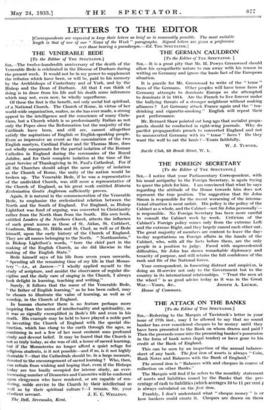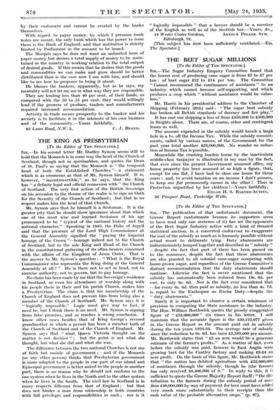THE ATTACK ON THE BANKS
[To the Editor of TIIE SPECTATOR.]
SIR,—Referring to the Marquis of Tavistock's letter in your issue of 17th inst., may I be allowed to say that no sound banker has ever considered cheques to be money until they have been presented to the Bank on whom drawn and paid ? Then the proceeds come into the presenting banker's possession in the form of bank notes (legal tender) or have gone to his credit at the Bank of England.
This can be seen by an inspection of the annual balance- sheet of any bank. The first item of assets is always " Coin, Bank Notes and Balances with the Bank of England."
The second item is " Balances with and cheques in course of collection on other Banks."
The Marquis will find if he refers to the monthly statement of assets and liabilities issued by the Banks that the per- centage of cash to liabilities (which averages 10 to 11 per cent.) is always calculated on the first item.
Frankly, I don't understand what " cheque money " is or how bankers could create it. Cheques are drawn on them by their customers and cannot be created by the banks themselves.
With regard to paper money, by which I presume bank notes are meant, the only bank which has the power to issue them is the Bank of England, and that institution is strictly limited by Parliament in the amount to be issued.
The Marquis says he does not want an unlimited issue of paper money but desires a total supply of money to be main- tained in the country in working relation to the total output of desired goods. If this means that he desires that the goods and commodities we can make and grow should be better distributed than is the case now I am with him, and should like to see how he proposes to bring it about.
He blames the bankers, apparently, but as he says, my mentality will not let me see in what way they are responsible.
They are lending less than 40 per cent. of their funds, as compared with the 50 to 55 per cent. they would willingly lend if the growers of produce, traders and manufacturers required increased accommodation.
Activity in trade means prosperity to the banker and his anxiety is, to facilitate it in the interests of his own business and of the community.—Yours faithfully,















































 Previous page
Previous page